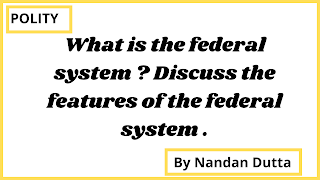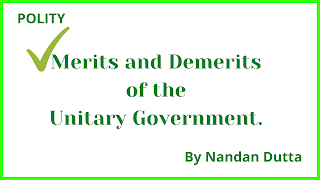Differences / Comparative Discussion between Presidential Government and Cabinet Government.
Differences / Comparative Discussion between Presidential Government and Parliamentary System.
Distinction / Difference between Parliamentary and Presidential forms of Government.
The difference between a presidential government and a cabinet government.
The difference between a presidential government and a parliamentary system of government.
Governments established on the basis of the principle of separation of powers, can be divided into two classes; Namely - President-led government and Cabinet-led or parliamentary government. In these two systems of government, the government is elected by the people for a fixed period of time. However, there are many differences between the two types of government. The differences are as follows: -
1. Differences in the construction of the legislature: - In the case of a government ruled by the President, the head of state is not appointed by the legislature. He is directly appointed by the people. Therefore, in a government led by the President, the head of state cannot control the legislature in any way or the legislature cannot control the president.
But in a parliamentary system of government, the head of state is constitutional and he is considered an integral part of the legislature. He may convene or adjourn the session of Parliament. No bill can become law even without the consent of the President.
2. Differences in the nature of the head of state: - In a system of government run by the President, all the powers of the state are vested in the President. He is the real ruler of the country.
On the other hand, the head of state in a cabinet-run government is constitutional. That is, theoretically he is the head of state but not the head of government. That is, he manages the state by his subordinate ministers. In this case, the prime minister is the real head of state.
3. Differences in responsibilities to the legislature: - In a system of government run by the President, the President is directly appointed by the people. So he is not responsible to the legislature for his work in any way.
But in a cabinet-led government, the cabinet is appointed by the legislature. As a result, they are jointly responsible to the people and the legislature.
4. Differences in the removal of the President: - In a government ruled by the President, the legislature cannot remove the President by bringing a motion of no confidence against him. Only on the grounds of incompetence, treason, etc. can the President be removed.
But in a parliamentary system of government, the cabinet always has to maintain a majority in the legislature. If the cabinet loses its majority, the legislature can dissolve the cabinet before its term expires.
5. Differences in the relationship between the legislature and the executive: - There is no relationship between the legislature and the president as the principle of separation of powers is recognized in the system of government run by the president. Here the legislature cannot control the president in any way and the president cannot participate in the session of the legislature or in the question and answer session.
But in a parliamentary system of government there is a direct relationship between the government and the legislature. The legislature can control directly here. The members of the cabinet are elected from among the elected members of the majority party in the legislature.
6. Differences in the powers of the Cabinet: - In a system of government run by the President, the Ministers are elected directly by the President. The duration of the tenure of the ministers depends on the will or reluctance of the President. Here the ministers are only loyal employees of the President.
But in a cabinet-run system of government, the majority party leaders are appointed prime minister and other ministers. In such a system of government, the prime minister has the upper hand, but the other ministers have the power to formulate independent powers and policies.
7. Differences in the composition of the cabinet: - In a system of government governed by the President, the ministers are directly appointed by the President. The President forms the cabinet with his subordinates or others on the basis of his own will or reluctance.
But in a cabinet-run system of governance, the president appoints members of the cabinet, but he does so on the advice of the prime minister. In other words, the President does not have any direct power in forming the cabinet.
8. Differences in Sustainability: - The Presidential government is more stable than the cabinet system. In a presidential government, the president or other ministers cannot be removed without specific allegations.
But a no-confidence motion could bring down the government before the end of the term in the cabinet-run system.
9. Differences in the separation of powers: - The principle of separation of powers is followed in the system of government run by the President. Here the executive, the legislature and the judiciary operate independently of each other on the basis of the principle of separation of powers.
But the principle of separation of powers is not followed in the system of governance run by the cabinet. As a result, there is a close relationship between the legislature and executive departments and they influence each other in the conduct of their business.
10. Question of supremacy of the judiciary: - In the system of government ruled by the President, the judiciary is completely out of control from legislature or executive and the supremacy of the judiciary is given priority in the state.
But in the cabinet-run governance, the legislature is given precedence over the judiciary, and the legislature and executive can control the judiciary.
11. Differences in case of emergency: - The system of government run by the President is more effective in case of emergency than the parliamentary system. Here the president himself can make the necessary decisions for emergencies.
But in a cabinet-run system of governance, decisions have to be made through a variety of negotiations. Therefore, the system of governance run by the cabinet is not more effective in case of emergency.
12. Differences in the majority in the legislature: - In a system of government run by the President, the President is directly appointed by the people. Here the majority in the legislature has nothing to do with the election of the President.
But in a cabinet-run system of government, the government is formed on the basis of majority in the legislature. No government can be formed in the parliamentary system by any means other than a single majority.









